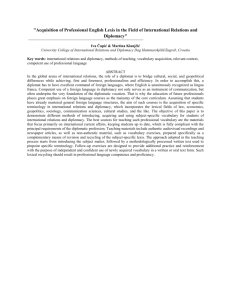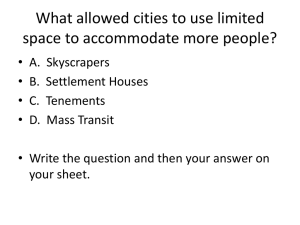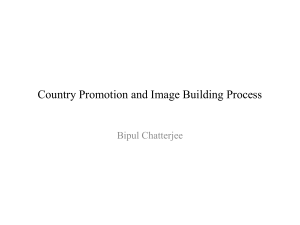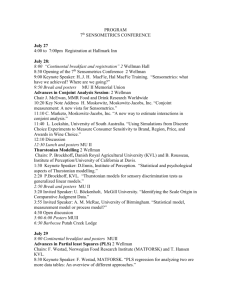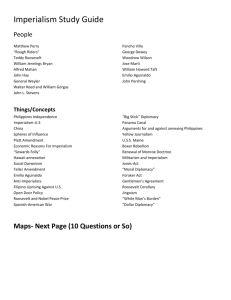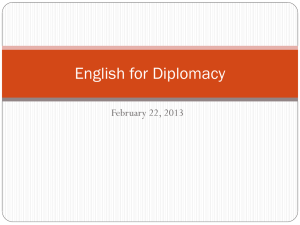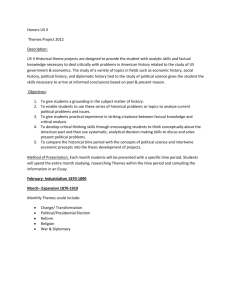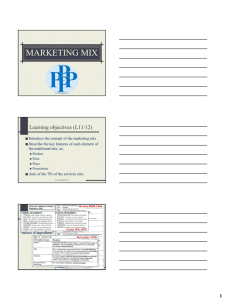David Joseph Wellman, Sustainable Diplomacy: Ecology, Religion
advertisement
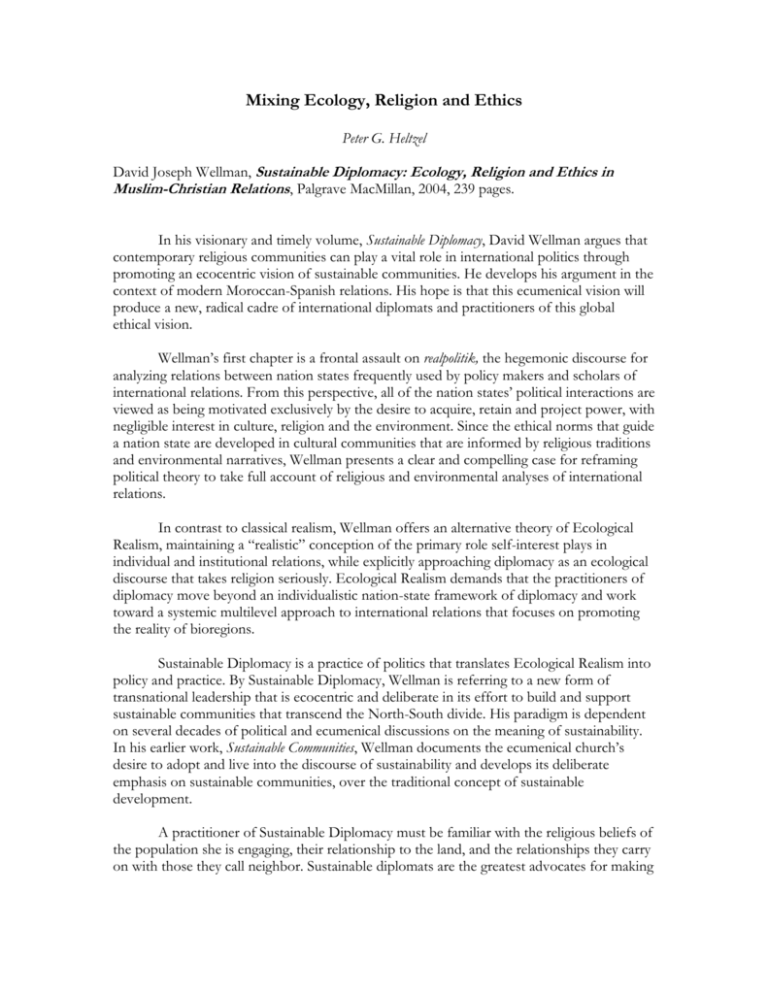
Mixing Ecology, Religion and Ethics Peter G. Heltzel David Joseph Wellman, Sustainable Diplomacy: Ecology, Religion and Ethics in Muslim-Christian Relations, Palgrave MacMillan, 2004, 239 pages. In his visionary and timely volume, Sustainable Diplomacy, David Wellman argues that contemporary religious communities can play a vital role in international politics through promoting an ecocentric vision of sustainable communities. He develops his argument in the context of modern Moroccan-Spanish relations. His hope is that this ecumenical vision will produce a new, radical cadre of international diplomats and practitioners of this global ethical vision. Wellman’s first chapter is a frontal assault on realpolitik, the hegemonic discourse for analyzing relations between nation states frequently used by policy makers and scholars of international relations. From this perspective, all of the nation states’ political interactions are viewed as being motivated exclusively by the desire to acquire, retain and project power, with negligible interest in culture, religion and the environment. Since the ethical norms that guide a nation state are developed in cultural communities that are informed by religious traditions and environmental narratives, Wellman presents a clear and compelling case for reframing political theory to take full account of religious and environmental analyses of international relations. In contrast to classical realism, Wellman offers an alternative theory of Ecological Realism, maintaining a “realistic” conception of the primary role self-interest plays in individual and institutional relations, while explicitly approaching diplomacy as an ecological discourse that takes religion seriously. Ecological Realism demands that the practitioners of diplomacy move beyond an individualistic nation-state framework of diplomacy and work toward a systemic multilevel approach to international relations that focuses on promoting the reality of bioregions. Sustainable Diplomacy is a practice of politics that translates Ecological Realism into policy and practice. By Sustainable Diplomacy, Wellman is referring to a new form of transnational leadership that is ecocentric and deliberate in its effort to build and support sustainable communities that transcend the North-South divide. His paradigm is dependent on several decades of political and ecumenical discussions on the meaning of sustainability. In his earlier work, Sustainable Communities, Wellman documents the ecumenical church’s desire to adopt and live into the discourse of sustainability and develops its deliberate emphasis on sustainable communities, over the traditional concept of sustainable development. A practitioner of Sustainable Diplomacy must be familiar with the religious beliefs of the population she is engaging, their relationship to the land, and the relationships they carry on with those they call neighbor. Sustainable diplomats are the greatest advocates for making religious and ecological analysis of international affairs central to the core practices of diplomacy that help positively shape national and international law and policy. Wellman’s method is innovative, dialogical and interdisciplinary. The lion’s share of his research is based on fieldwork gathered through more than 160 hours of face-to-face interviews with citizens of Spain and Morocco in six languages. He developed a set of questions building on the work of Daniel Spencer’s notion of ecological location in which he asked people about what the land means to them, how they receive their food, the stories they grew up with, and their connection to the earth and their neighbors. He frames the study theoretically in conversation with a number of disciplines; as a result, this text should be required reading in a variety of courses, including International Relations, Christian and Islamic Ethics, and Environmental Studies. In Chapter 2, Wellman weaves a colorful narrative of the eco-historical landscape of Moroccan-Spanish relations. In Chapters 3 through 5, he considers three environmental and social problems: land, natural resources, and immigration. In Chapter 3 he looks at the land, including “the common genetic, geographic, and biological reality” that Moroccans and Spaniards share. In Chapter 4 he describes conflicts over natural resources, especially in the fishing trade, and considers resources within Christianity and Islam for resolving these conflicts. He explores the problems of immigration and illegal labor in Chapter 5 and looks to the story of Abraham and the strangers as a model for just labor and racial reconciliation. In his final chapter, “The Future of Sustainable Diplomacy,” Wellman identifies several impediments of implementing sustainable diplomacy: the “cult” of the nation-state, the power of globalization, the growing phenomenon of “tribalism,” the lack of basic human rights, and our increasing collective inability to imagine a better, more egalitarian and cooperative international community [pp. 169-171]. My primary criticism of Sustainable Diplomacy is the privileging of the environment as the primary hermeneutical lens for international relations. While ethically laudable, this approach needs to be more clearly theoretically integrated into the anthropocentric structure of contemporary statecraft and Christian ethics, as well as explicitly developing an alternative bioregional economic model (e.g., ecological economics) to counter the hegemony of neoliberal capitalism. While I agree that the power of economic globalization is an impediment to Sustainable Diplomacy, I think Wellman underestimates its power. Wellman needs a more specific economic account of the reasons why Morocco has not been more easily integrated into “Fortress Europe.” Are the reasons for this religious, environmental, or economic? Economic globalization—particularly advanced capitalism that is mediated through multinational corporations and financial institutions of the North like the International Monetary Fund, the World Bank, the World Trade Organization, and the G8 Summit—have an inordinate amount of power in defining the terms of both diplomacy and ecological practice. It is precisely the liberalized capital flows that put pressure on the nation states and the bioregion’s ability to operate in a sustainable manner. By not analyzing the economics of the region in more detail and suggesting concrete alternatives at the level of local, national, and bioregional economic policy, Wellman misses a strategic opportunity to strengthen his theory. One important contribution of this book is translating the ecumenical vision of sustainable community into other disciplines and spheres of action including international relations and cooperative interreligious dialogue. His discussion is grounded in the concrete particularity of historic and contemporary political relations between Morocco and Spain. This focus on Morocco and Spain is important because of the multiple issues that this boundary symbolizes, including the one between the North and the South, the Muslim and Christian. With the birthrate in Muslim societies more than doubling the European average, the Islamic countries of Northern Africa and the Middle East will inevitably place new and different diplomatic pressure on Europe and the United States in the years ahead. Wellman presents a nuanced account of Islam, strategically analyzing the traditional divide between Sunnis and Shiites, as well as the split between those Muslims seeking a peaceful modus vivendi with the West and those drawn to Islamic radicalism. Wellman’s forward-thinking political paradigm and nuanced account of religion holds great promise for the complexity of contemporary international relations. Wellman also provides concrete ways that Christianity and Islam can play a positive role in confronting a multitude of issues that face the world today, including consumption, resource scarcity, illegal immigration, and conflict resolution across the North-South split. It is hoped that this work will inspire political theorists and religious ethicists to have a more focused interrogation of a similar set of questions at the border between the United States and Mexico. Sustainable Diplomacy based on Ecological Realism is a fresh call for prophetic witness by all aspects of civil society. It is a model of international relations that emphasizes a wider role for religious and secular NGOs, people on the ground, the tools of the Ecological Footprint, and the notion of Ecological Location. If we are going to survive as an earth community, it will be as a result of sustainable diplomats who are able to graciously work and network for justice, peace and love. Wellman’s commitment to helping people see the liberative potential of religion and the environment for conflict resolution in international relations demonstrates that he has journeyed to a land where few theorists and ethicists have been. May many follow quickly behind!
